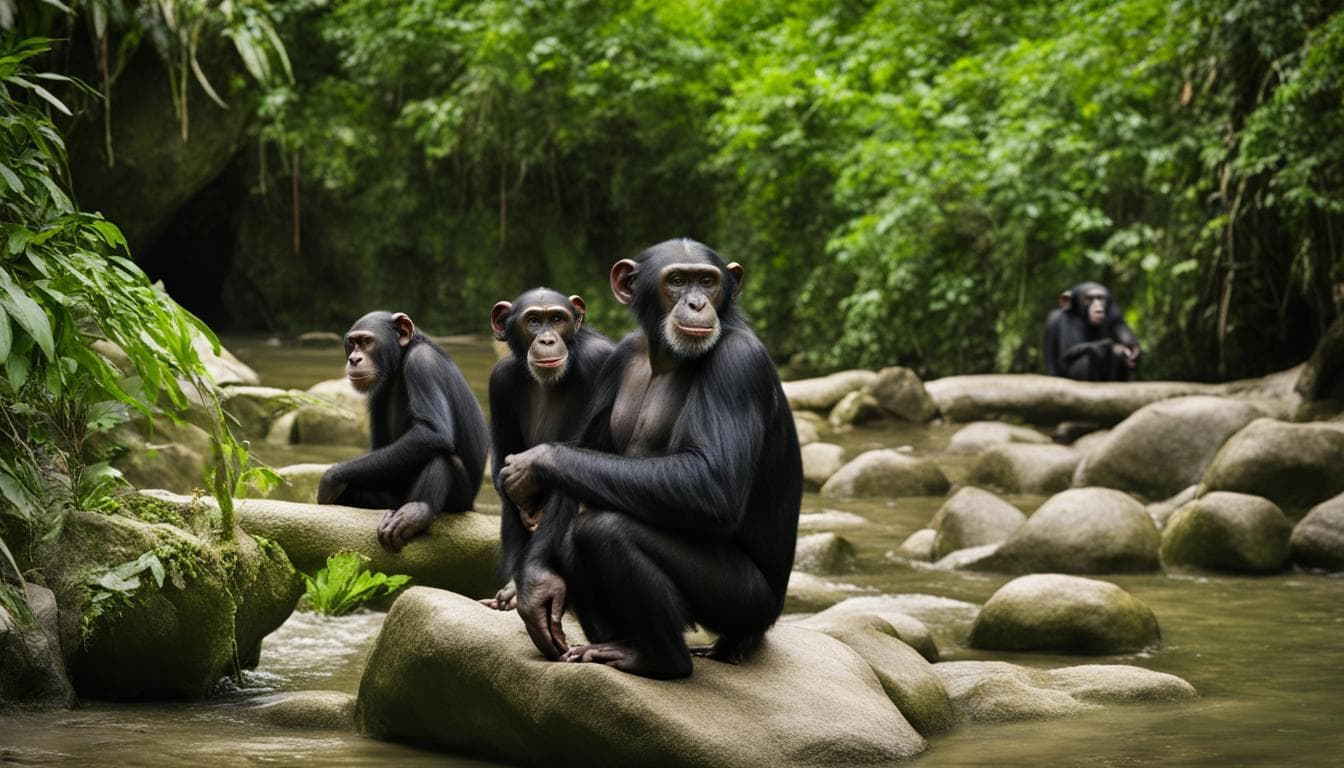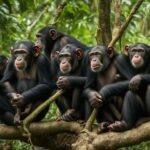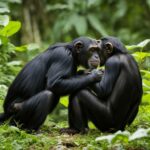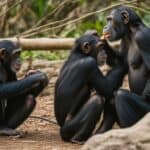Chimpanzee tourism has become increasingly popular in recent years, attracting primate enthusiasts and nature lovers from around the world. However, the impact of this tourism on chimpanzee populations and wildlife conservation efforts is an important concern.
Chimpanzees, as an endangered species, already face numerous threats to their survival, such as habitat loss and poaching. The rise in primate tourism further exacerbates these challenges and puts additional pressure on their delicate ecosystems.
By venturing into chimpanzee habitats, tourists inadvertently disrupt the natural behaviors and daily routines of these magnificent creatures. Increased human presence can lead to stress and disturbance among chimpanzee populations, impacting their overall well-being and reproductive success.
Furthermore, the potential for disease transmission between humans and chimpanzees during primate tourism activities poses a significant risk to the already vulnerable populations. Tourists engaging in chimpanzee tracking may unknowingly transmit diseases to these primates, further endangering their survival.
It is crucial that we strike a balance between satisfying our desire to observe and interact with these incredible creatures and ensuring their long-term conservation. Implementing sustainable tourism practices, such as limiting the number of tourists and promoting responsible travel behavior, can help minimize the negative impact on chimpanzee populations.
Protecting chimpanzees and their habitats is not only vital for their own survival but also for the preservation of biodiversity and the balance of fragile ecosystems. Through concerted conservation efforts, we can safeguard these endangered species for future generations to appreciate and learn from their remarkable intelligence and social behaviors.
Stay tuned for the upcoming sections of this article as we delve deeper into the various aspects of chimpanzee tourism impact, the importance of conservation, and the urgent need for action to protect these incredible creatures.
The impact of human behavior on disease transmission during chimpanzee tracking
When engaging in chimpanzee tracking activities during eco-tourism adventures, it is essential to consider the impact of human behavior on disease transmission to these incredible primates. Tourists can unknowingly transmit diseases to chimpanzees through simple actions such as coughing, sneezing, touching their faces, or even touching objects that chimpanzees subsequently come into contact with. To minimize the risk of disease transmission and ensure responsible travel, it is crucial to take the necessary precautions.
Zoonotic disease transmission and responsible travel
Responsible travel practices can significantly reduce the risk of zoonotic disease transmission between humans and chimpanzees. Some recommended measures include limiting tourist numbers to minimize the potential for disease spread, promoting hand hygiene through the use of hand sanitizers or handwashing facilities, and encouraging the use of protective measures like face masks. These preventive actions not only protect the chimpanzees but also safeguard the health and well-being of travelers.
“Responsible travel practices can significantly reduce the risk of zoonotic disease transmission.”
By following these responsible travel guidelines, tourists can help protect the health and conservation of chimpanzees, ensuring that they can continue to thrive in their natural habitats. Additionally, implementing sustainable tourism practices that prioritize the well-being of wildlife and their ecosystems further contributes to the overall conservation efforts.
| Disease transmission prevention | Benefit |
|---|---|
| Limiting tourist numbers | Reduces the potential for disease spread |
| Promoting hand hygiene | Minimizes the risk of disease transmission through contact |
| Using protective measures (e.g., face masks) | Provides an additional barrier against disease transmission |
Chimpanzee tracking offers an incredible opportunity to witness these marvelous creatures in their natural habitat. By practicing responsible travel and prioritizing the well-being of chimpanzees, we can ensure the long-term survival and conservation of these endangered species, while also enriching our own experiences and understanding of the natural world.
The Importance of Chimpanzee Conservation
Chimpanzees are remarkable creatures that not only contribute to the biodiversity and ecological balance of their habitats but also provide crucial insights into human evolution and behavior. Their conservation is of utmost importance in order to preserve these endangered species and protect the delicate ecosystems they inhabit.
Chimpanzees play a vital role in forest regeneration, acting as frugivores and dispersing seeds over large areas. They ingest fruits and deposit the seeds in new locations, contributing to the spatial distribution and genetic diversity of plant communities. This process helps maintain a healthy balance of plant species and supports the overall biodiversity of the forests.
Furthermore, chimpanzees are our closest living relatives and share many behavioral and cognitive traits with humans. By studying these intelligent creatures, we gain valuable insights into our own evolutionary history. Understanding their social structures, communication methods, and problem-solving abilities provides a deeper understanding of our own species and sheds light on the intricate complexities of human nature.
| Key Contributions of Chimpanzees to Wildlife Conservation |
|---|
| Act as frugivores and facilitate seed dispersal, aiding in forest regeneration |
| Contribute to the overall biodiversity of tropical forest ecosystems |
| Provide insights into human evolution and behavior through their genetic similarity and behavioral traits |
Conservation efforts for chimpanzees should not only focus on their direct protection but also promote ethical tourism practices. Responsible travel choices can help ensure that tourism activities do not disrupt their natural habitats or cause harm to the chimpanzee populations. By supporting sustainable and ethical tourism, we can contribute to the preservation of these incredible creatures while also benefiting local communities.
The importance of chimpanzee conservation cannot be overstated. By protecting these endangered species and their habitats, we not only safeguard the delicate balance of ecosystems but also preserve a significant part of our own evolutionary heritage. It is essential that we take action now to ensure the future survival of chimpanzees and the invaluable contributions they make to the natural world.
The threats to chimpanzees and the need for action
Chimpanzees, our closest living relatives, are facing numerous threats that put their survival at risk. The primary culprit is habitat loss, as human activities such as deforestation and agricultural expansion continue to encroach upon their natural habitats. These activities not only destroy the forests that chimpanzees rely on for food and shelter but also fragment their habitat, making it more challenging for populations to thrive.
Poaching is another significant threat to chimpanzees. The illegal trade in bushmeat and the demand for exotic pets result in the capture and killing of thousands of chimpanzees each year. This not only affects the population directly but also disrupts social structures within chimpanzee communities, leading to long-term consequences for their survival.
Wildlife trafficking exacerbates the poaching problem, as it provides avenues for the illegal trade of chimpanzees and their body parts. The demand for chimpanzees as pets, entertainment attractions, and status symbols fuels this illicit trade, further decimating their populations. Strict regulation, robust law enforcement, and public education are crucial in combating wildlife trafficking and protecting chimpanzees from exploitation.
| Threat | Impact |
|---|---|
| Habitat loss | Reduces suitable forested habitat for chimpanzees |
| Poaching | Results in the capture and killing of chimpanzees for bushmeat and the exotic pet trade |
| Wildlife trafficking | Facilitates the illegal trade of chimpanzees and their body parts |
To address these threats and ensure the long-term survival of chimpanzees, action must be taken. Sustainable tourism can play a vital role in conservation efforts by providing alternative livelihoods for local communities and supporting initiatives that protect chimpanzees and their habitats. By promoting responsible travel practices and supporting ethical tourism operators, we can contribute to the preservation of these endangered species and their ecosystems.
The role of chimpanzees in seed dispersal and forest ecosystems
Chimpanzees, as frugivores, play a vital role in tropical forest ecosystems by facilitating seed dispersal. When chimpanzees consume fruits, they inadvertently ingest seeds, which are later dispersed through their feces. This natural process contributes to forest regeneration and enhances the spatial and genetic diversity of plant communities. Some tree species rely heavily on chimpanzees as their primary seed dispersers, highlighting the importance of these primates in maintaining biodiversity and healthy forest ecosystems.
Studies have shown that chimpanzees disperse seeds over significant distances, allowing plant species to establish in new areas and ensuring their long-term survival. This process also helps to maintain genetic variation within populations, which is crucial for the adaptability and resilience of plant communities. Without the active involvement of chimpanzees as seed dispersers, certain tree species may struggle to reproduce, leading to a decline in their populations and potentially disrupting the delicate balance of forest ecosystems.
The interconnectedness of chimpanzees, seed dispersal, and biodiversity
The impact of chimpanzees on seed dispersal extends beyond the individual trees they interact with. By promoting the growth and survival of various plant species, chimpanzees contribute to the overall biodiversity of tropical forests. Biodiversity is essential for maintaining ecosystem stability, as it enhances ecosystem services, such as carbon storage, water filtration, and nutrient cycling.
Furthermore, the dense vegetation created by diverse plant communities provides habitat and resources for countless other organisms, including insects, birds, and mammals. The interconnectedness of species within these ecosystems is crucial for their long-term viability and resilience in the face of environmental changes. Therefore, by safeguarding chimpanzees and their role in seed dispersal, we can help protect the intricate web of life that relies on tropical forests.
| Benefits of Chimpanzee Seed Dispersal | Implications of Chimpanzee Decline |
|---|---|
|
|
“Chimpanzees are vital for maintaining the health and resilience of tropical forests through their role as seed dispersers. Their decline could have far-reaching ecological consequences and impact the biodiversity that sustains countless species.”

The urgency of combating illegal wildlife trafficking
The illegal wildlife trade, including the trade in chimpanzees, poses a grave threat to the survival of these magnificent creatures and their habitats. Despite being banned under the Convention on International Trade in Endangered Species of Wild Fauna and Flora (CITES), wildlife trafficking continues to flourish, driven by the demand for bushmeat and exotic pets.
The trade in chimpanzees not only results in the loss of their natural habitat but also increases contact and conflicts between humans and chimpanzees. This further exacerbates the decline of chimpanzee populations and threatens their long-term survival. Stricter regulation, robust law enforcement, and public education are vital in combating wildlife trafficking and protecting chimpanzees from exploitation.
The illegal wildlife trade ranks among the most significant illegal activities globally. It is estimated that thousands of chimpanzees have been captured and traded illegally between 2005-2011 alone. This shocking statistic underscores the urgent need for action to combat the illegal wildlife trade and safeguard these endangered species.
By raising awareness about the consequences of wildlife trafficking and supporting conservation efforts, we can make a significant impact. It is crucial for governments, organizations, and individuals to work together in implementing strict measures to deter poaching, disrupt illegal supply chains, and reduce demand for wildlife products. Only through collective action and unwavering commitment can we ensure the survival of chimpanzees and protect the biodiversity of our planet for future generations.
| Table: Impact of Illegal Wildlife Trafficking on Chimpanzees | |
|---|---|
| Habitat Loss | Reduction in suitable forested habitat due to human activities |
| Poaching | Chimpanzees captured and traded illegally for bushmeat and exotic pets |
| Human-Chimpanzee Conflicts | Increased contact between humans and chimpanzees due to habitat encroachment |
| Genetic Diversity Loss | Disruption of natural gene flow and reduced genetic variation in chimpanzee populations |
The need for public support and conservation efforts
Conservation organizations play a critical role in protecting chimpanzees and their habitats. The Chimpanzee Conservation Centre and the Jane Goodall Institute are just two examples of organizations that are working tirelessly to ensure the survival of these endangered primates. These organizations rely heavily on public support to fund their conservation initiatives and make a lasting impact.
One of the most important ways individuals can contribute to chimpanzee conservation is by raising public awareness about the importance of these incredible creatures. By sharing information about the threats they face and the role they play in maintaining biodiversity, we can inspire others to take action.
Supporting ethical tourism practices is another tangible way individuals can contribute to chimpanzee conservation. By choosing responsible travel options, such as eco-lodges and primate-friendly tours, we can minimize the negative impact of tourism on chimpanzee populations and their habitats. Additionally, donating to conservation organizations provides crucial financial support for research, habitat restoration, and community outreach programs.
Together, we can make a difference for chimpanzees. By supporting conservation organizations, raising public awareness, and making responsible travel choices, we can help protect these amazing animals for future generations to enjoy.
Conclusion
Chimpanzee populations and wildlife conservation efforts are facing significant challenges, including habitat loss, disease transmission, and wildlife trafficking. To protect these endangered species and their habitats, it is crucial to implement sustainable tourism practices and conservation measures.
By limiting tourist numbers, promoting responsible travel behavior, and strictly regulating illegal wildlife trade, we can help safeguard chimpanzee populations. These intelligent creatures play a vital role in their ecosystems, contributing to biodiversity, forest regeneration, and carbon storage in tropical regions.
Your support is key in preserving chimpanzees and their habitats. By choosing ethical tourism practices, making responsible travel choices, and donating to reputable conservation organizations, you can actively contribute to chimpanzee conservation efforts. Together, we can ensure the survival of these incredible creatures for future generations.
What are the potential negative effects of chimpanzee tourism on conservation efforts?
The impact of chimpanzee tourism on conservation efforts can be negative in several ways. Increased human presence can disrupt the natural behavior of chimpanzees, cause stress, and spread diseases. Tourists may also leave behind waste and litter, further degrading the delicate ecosystem.
FAQ
How does chimpanzee tourism impact chimpanzee populations and conservation efforts?
Chimpanzee tourism can potentially transmit diseases to chimpanzees and contribute to habitat loss. By limiting the number of tourists, promoting responsible travel behavior, and implementing strict regulations against illegal wildlife trade, we can mitigate these impacts and protect chimpanzee populations.
What is the impact of human behavior on disease transmission during chimpanzee tracking?
Tourists engaging in chimpanzee tracking activities can potentially transmit diseases to chimpanzees through behaviors like coughing, sneezing, and touching their faces. Limiting the number of tourists, promoting hand hygiene, and using protective measures like face masks can help reduce the risk of disease transmission between humans and chimpanzees during primate tourism activities.
What is the importance of chimpanzee conservation?
Chimpanzees play a vital role in their ecosystems by influencing forest regeneration, biodiversity, and seed dispersal. They are closely related to humans and provide insights into human evolution and behavior. Conserving chimpanzees is essential for preserving biodiversity and understanding our own origins.
What are the threats to chimpanzees and the need for action?
Chimpanzees face threats such as habitat loss, poaching, and wildlife trafficking. To protect chimpanzees, we need to address these threats through measures like sustainable tourism, stricter regulation, law enforcement, and public education on the importance of chimpanzees.
What is the role of chimpanzees in seed dispersal and forest ecosystems?
Chimpanzees play a crucial role in tropical forest diversity and regeneration through seed dispersal. They ingest seeds and deposit them in new areas, contributing to the spatial and genetic structure of plant communities. Their impact on seed dispersal helps maintain biodiversity and carbon storage in tropical regions.
Why is it urgent to combat wildlife trafficking?
Wildlife trafficking, including the trade in chimpanzees, is thriving despite being banned under CITES. It contributes to the decline of chimpanzee populations and leads to habitat loss and increased contact and conflicts between humans and chimpanzees. Stricter regulation, law enforcement, and public education are crucial in combating wildlife trafficking and protecting chimpanzees from exploitation.
Why is public support and conservation efforts important?
Conservation organizations work tirelessly to protect chimpanzees and their habitats, but they heavily rely on public support to be effective in their efforts. Public awareness and education on the importance of chimpanzees are essential for garnering support for conservation initiatives. Supporting ethical tourism practices, responsible travel choices, and donating to conservation organizations are tangible ways individuals can contribute to chimpanzee conservation.
What is the conclusion regarding chimpanzee populations and conservation efforts?
Chimpanzee tourism has a significant impact on chimpanzee populations and conservation efforts. To protect these endangered species and their habitats, we must take action by limiting tourist numbers, promoting responsible travel behavior, and implementing strict regulations against illegal wildlife trade. Chimpanzees are crucial for the health of their ecosystems and contribute to our understanding of human evolution.







